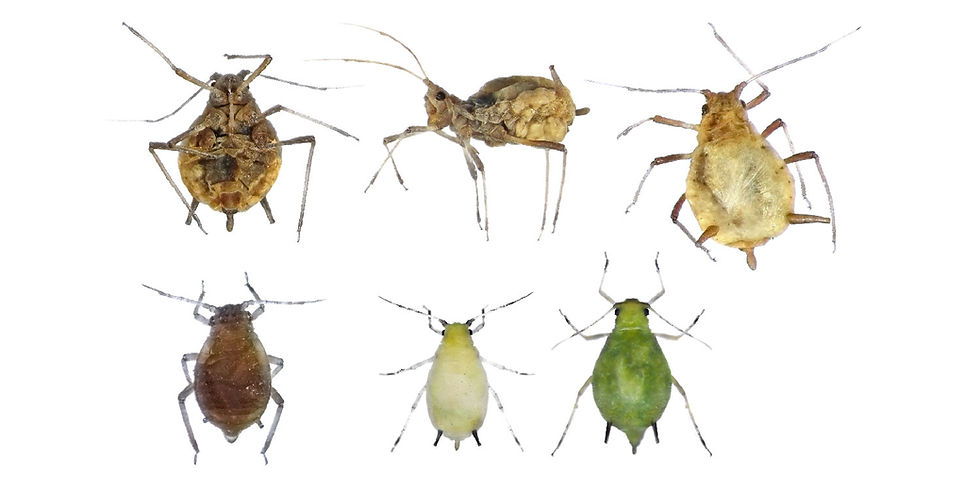
Scientific name: Aphidoidea
Most edible gardens would have experienced the infestation of Aphids. There are many varieties of Aphids, green ones, brown ones, urggggh. LOL and like all pests, they MULTIPLY very quickly.
Aphids damage a huge variety of host plants by sucking the juices from leaves and stems, causing discolouration, leaf curling, yellowing, and stunted growth. Large infestations can produce a sticky, sugary waste product known as honeydew. Honeydew can attract ants, and fuel the growth of fungus on plant surfaces. Aphids can also transmit plant viruses, injecting them into the plant as they feed. These viruses can cause molting, yellowing, or poor yields in various garden vegetables and ornamentals. In an aphid's average lifetime of one month, they can produce 40-85 offspring. Some aphids have wings; some do not.

Nymphs and adults feed on plant juices, attacking leaves, stems, buds, flowers, fruit, and/or roots, depending on the species. Most aphids especially like succulent new growth. Some, such as the green peach aphid, feed on a variety of plants, while others, such as the rosy apple aphid, focus on one or just a few plant hosts.
HOW TO GET RID OF APHIDS
Try spraying cold water on the leaves; sometimes all aphids need is a cool blast to dislodge them. Typically they are unable to find their way back to the same plant.
If you have a large aphid invasion, dust plants with flour. It constipates the pests.
Neem oil, insecticidal soaps, and horticultural oils are effective against aphids. Be sure to follow the application instructions provided on the packaging.
You can often get rid of aphids by wiping or spraying the leaves of the plant with a mild solution of water and a few drops of dish soap. Soapy water should be reapplied every 2-3 days for 2 weeks.
One variation of this soap-water mix includes cayenne pepper: Stir together 1 quart water, 1 tsp liquid dish soap, and a pinch of cayenne pepper. Do not dilute before spraying on plants.
Isopropyl alcohol (also called isopropanol or rubbing alcohol) works fine and is easy to find, but be sure it doesn’t have additives. Ethanol (grain alcohol) seems to work best. You can also add alcohol to a soapy emulsion to make it more effective. For example, in a spray bottle, combine 5 cups water, 2 cups alcohol, and 1 tablespoon liquid soap.
Diatomaceous earth (DE) is a non-toxic, organic material that will kill aphids. Do not apply DE when plants are in bloom; it is harmful to pollinators, too.
PREVENTION
Frequent monitoring helps in identifying early infestations. Regularly inspect new growth, flower buds, stems, and tender shoots.
As a general good practice, just Spray your favourite concoction of Natural Insecticide every couple of days. It has helped us curb most pests challenges.
Avoid overusing nitrogen fertilizer, which aphids love.
Consider providing a habitat for other insects that that feed or prey on aphids, such as lady beetles, parasitic wasps, and lacewings. To do that, avoid using broad-spectrum insecticides, and try to make nectar available throughout the season.
Check this out:
Kaiser OTC benefits provide members with discounts on over-the-counter medications, vitamins, and health essentials, promoting better health management and cost-effective wellness solutions.
Obituaries near me help you find recent death notices, providing information about funeral services, memorials, and tributes for loved ones in your area.
is traveluro legit? Many users have had mixed experiences with the platform, so it's important to read reviews and verify deals before booking.
This unique game has piqued the interest of many people. With its unique game experience and innovative game atmosphere, scribble io is a fantastic way for you and your friends to pass the time
How To Enlarge Your Penis Size Naturally In Just 5 Days In Pietermaritzburg City In KwaZulu-Natal Call ✆ +27710732372 Penis Enlargement Products In Cape Town South Africa,
(1).My penis is too small, how to enlarge it?
First of all, we have to define what small really means and what statistics apart from any personal impressions and taste actually say: The flaccid size is irrelevant, some men have a rather small penis growing to enormous size when erect, on the other hand there are men with a rather impressive flaccid penis that just erects itself when aroused and doesn't grow much in girth or length. Even in reputable studies, the statistical average varies, the US median is about 5.5 inch…